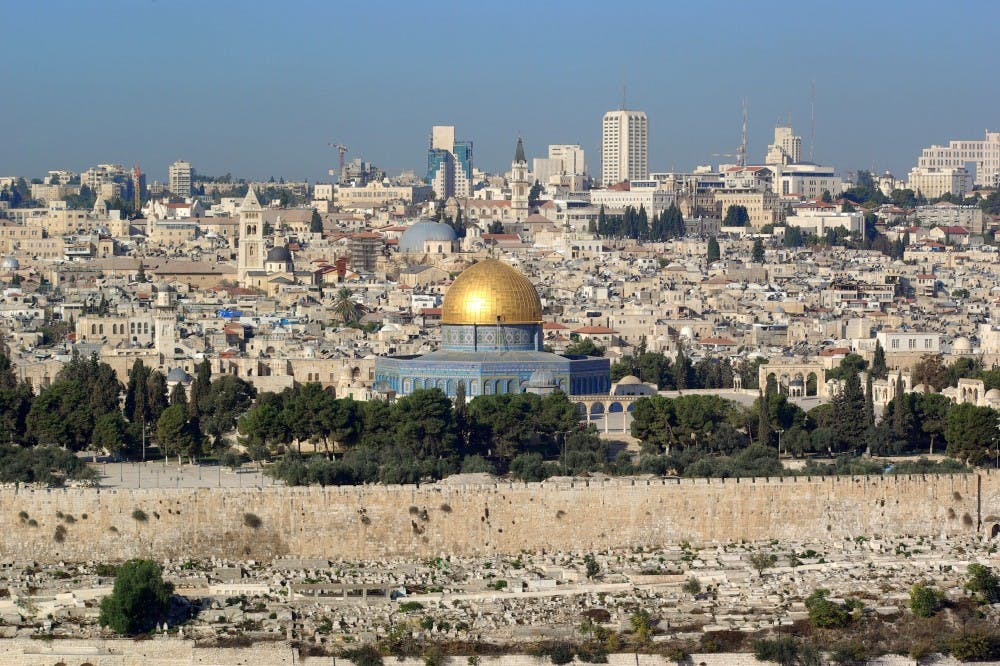On Nov. 21, the Israeli Attorney General announced four indictments levied against Prime Minister Benjamin Netanyahu. I saw the Facebook posts of dozens of my parents’ friends rejoice and celebrate what they described as the imminent “return of Israel to normalcy.”
Almost three weeks later, Netanyahu remains Premier, his poll numbers remain essentially unchanged, and the chances that he forces a third election this year only grow. It seems that these social media celebrations were premature, if not for naught.
When I discuss the Israeli-Palestinian conflict with my parents and their friends, I'm hard-pressed to find points of disagreement relating to facts on the ground. There is a wide consensus among American Jews that is in favor of a two-state solution and opposed to the Israeli occupation of the West Bank; the political situation in Israel has devolved to the point that even the American Israel Public Affairs Committee (AIPAC, a right-leaning pro-Israel advocacy organization) recently has been forced to condemn actions of the Netanyahu government.
My parents are peaceniks, and so are most of their friends. The generational divide manifests not in clashing policy proposals, or partisan affiliations, but rather competing political memories.
The Jewish Sages teach of two Jerusalems — one heavenly, the other earthly. For 2000 years the concept of a celestial Jerusalem aided a diasporic and oppressed community to imagine redemption and a homeland. This Platonic paradigm (holding both an ideal and its realized form) is helpful as a framework for understanding the current generational debate between American Jews.
My parents came of age to an Israel that was beginning to reckon with its oppression of Palestinians. There existed a popular movement for peace, with political leaders and coalitions strong and courageous enough to push for imperfect compromise. Their political adolescence was marked by a series of grand coalitions, power sharing between big-tent political parties. My father last lived in Israel as a first-year rabbinical student in 1992, which also marks the last year that Ha-Avoda (the center-left Israeli Labor Party) won more than 40 seats in the Israeli Parliament. This fall, the Labor Party barely passed the electoral threshold, winning five.
The Israel of my political awakening is an uncaring occupier, a nation convinced that the status quo is tenable, where the political range has shifted so far right that a possible Benny Gantz government is hailed by many as a left-wing victory, and the indictment of a prime minister is a cause for celebration, because too many fear that the threat of jail is the only thing that could compel him to leave office.
In my lifetime, there is only one Israeli government that could possibly be described as center-left, and it collapsed when I was barely one year old. As prime minister, Ehud Barak supported the illegal Jewish settlements in Hebron, and coined the phrase that there was “no partner for peace.” Without interruptions, since I was in third grade, the state has been led by Benjamin Netanyahu, who has unapologetically called for the annexation of the West Bank, expanded the settlements, incited the assassination of his political opponent, Yitzhak Rabin — the last nominally left-wing Prime Minister of Israel — and devoted himself to building relationships with neo-fascists around the world.

And yet, I didn’t care terribly that Netanyahu was indicted. Neither my Facebook wall nor those of my peers were plastered with celebrations. When it comes to Israel, many from my generation are jaded. We’re not convinced that whoever succeeds Netanyahu as Premier will be much different. When older generations speak of normalcy, we find ourselves lost at what they could possibly mean. 2017 marked a decade of the blockade on Gaza, and 50 years of the occupation in the West Bank. We see Netanyahu as symptom of a diseased politics, not the other way around.
I have been told by numerous adult Jewish leaders, whom I respect, that young, progressive Jews, like myself, should not air the “dirty laundry” of our community in public, and that we are too critical, pessimistic, and unforgiving in our outlook of Israel. What other conclusion do they expect us to come to when for our whole lives Israel has been dominated by the political right? It is no wonder we are more willing to indulge certain comparisons, rethink our institutional affiliations, and opt for protest.
In a generational twist, this intra-community conflict involves the young telling the middle-aged and elderly that they are the ones guilty of political naiveté. Their celestial Israel no longer bears much resemblance to the earthly one. I fear that their imagined Israel froze sometime between the election of Rabin in 1992 and the unsuccessful Clinton Parameters of 2001. They can’t help but see an Israel that is just one election, one prime minister away from “normalcy.”
Conflicts that divide the American Jewish community on the Israel question — whether it be about Israel-themed Shabbat, Birthright trips, or public speakers — will over time become more frequent and more fierce, as the generational chasm between the imagined and earthly Israel grows.

Zachariah Sippy is a sophomore from Lexington, Ky. He can be reached at zsippy@Princeton.edu.








